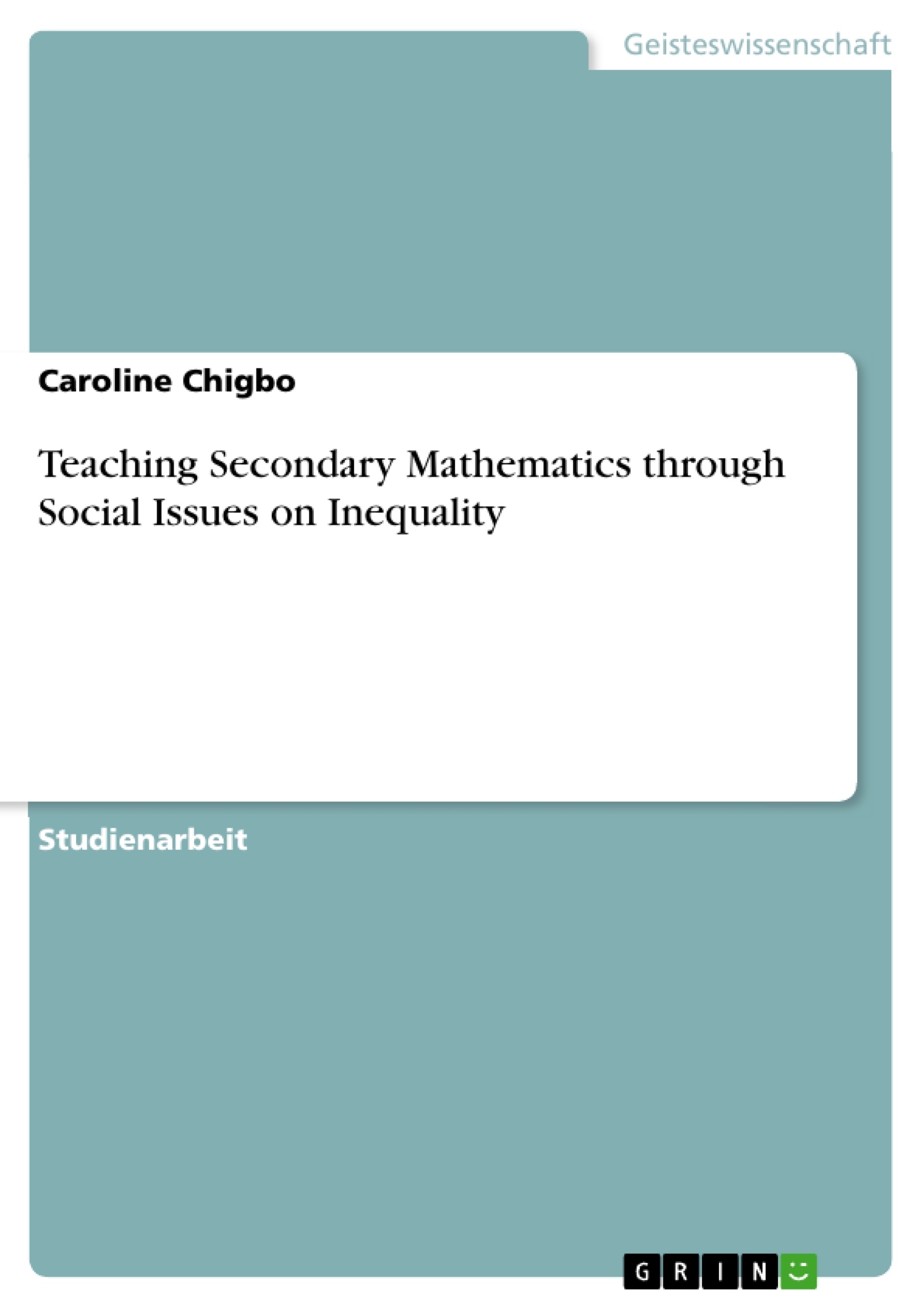This research is to unravel what has to be done in order to close the gap of gender inequality among various gender from this research, it is pertinent that the only way out is to roll out enough legislations dealing with unwholesome practices. These tend to promote social and gender inequality, create social awareness among diverse people of the world to see the parochialism of inequality and above all bring people into natural reasoning that equality opportunities, treatments, provision of education and facilities is central to developments.
Inhaltsverzeichnis
- Introduction
- The Research Question on Inequality
- Modeling with Data & Mathematics
- The Achievement Gap- Data Set
- Data Set and Math Skills
- Societal Socio-Economic Strata
- The Illustration On Societal Socio-Ecoomic Strata
- Helping the Peer to Refine or Push His/Her Thiking
- Response under Peers Achievement Gap
- Ineuality in Educational Access
- Reflection Opportunity....
Zielsetzung und Themenschwerpunkte
Diese Forschungsarbeit befasst sich mit der Frage, wie die Kluft der Geschlechterungleichheit in der Sekundarmathematik geschlossen werden kann. Sie untersucht die sozialen und wirtschaftlichen Ursachen der Ungleichheit sowie die Auswirkungen auf den Zugang zu Bildung und die Leistungsentwicklung von Schülern. Die Arbeit analysiert Daten und verwendet mathematische Modelle, um die Ursachen und Folgen von Ungleichheit zu untersuchen.
- Soziale und wirtschaftliche Ursachen von Geschlechterungleichheit
- Auswirkungen von Ungleichheit auf den Zugang zu Bildung
- Die Rolle von Mathematik im Verständnis von Ungleichheit
- Strategien zur Bekämpfung von Ungleichheit in der Bildung
- Die Bedeutung von Datenanalyse im Kontext von sozialer Gerechtigkeit
Zusammenfassung der Kapitel
- Introduction: Die Arbeit stellt das Problem der Geschlechterungleichheit in der Sekundarmathematik vor und beleuchtet die verschiedenen Dimensionen dieses Problems. Sie befasst sich mit der Situation in Nigeria und zeigt, wie traditionelle Praktiken und soziale Normen zur Ungleichheit beitragen.
- The Research Question on Inequality: Hier werden wichtige Fragen zur Geschlechterungleichheit aufgeworfen, die im weiteren Verlauf der Arbeit untersucht werden. Diese Fragen dienen als Leitfaden für die Forschung und fokussieren auf Ursachen, Folgen und Lösungsansätze.
- Modeling with Data & Mathematics: Dieses Kapitel beschäftigt sich mit der Rolle von Mathematik in der Untersuchung von Ungleichheit. Es wird erläutert, wie mathematische Modelle und Datenanalyse dazu beitragen können, die Ursachen und Auswirkungen von Ungleichheit besser zu verstehen.
- The Achievement Gap- Data Set: Dieses Kapitel präsentiert ein spezifisches Datensatzbeispiel, das die Beziehung zwischen dem Bildungsniveau der Eltern und der akademischen Leistung ihrer Kinder untersucht. Es zeigt auf, wie mathematische Analysen (z.B. lineare Regression) verwendet werden können, um diese Beziehung zu quantifizieren.
Schlüsselwörter
Die Arbeit befasst sich mit den Themen Geschlechterungleichheit, Sekundarmathematik, sozialer Gerechtigkeit, Datenanalyse, mathematische Modellierung, Bildungschancen, Leistungslücke, soziale und wirtschaftliche Faktoren, traditionelle Praktiken und Lösungsansätze für Ungleichheit.
Häufig gestellte Fragen
Wie kann Mathematikunterricht soziale Ungleichheit thematisieren?
Durch die Analyse von realen Datensätzen zu Themen wie Geschlechterungleichheit oder Bildungschancen können Schüler mathematische Modelle nutzen, um gesellschaftliche Probleme zu verstehen.
Was ist der „Achievement Gap“ in der Bildung?
Es beschreibt die Leistungslücke zwischen verschiedenen Schülergruppen, die oft durch den sozioökonomischen Status oder das Bildungsniveau der Eltern beeinflusst wird.
Welche Rolle spielt Modellierung in dieser Forschungsarbeit?
Mathematische Modellierung wird verwendet, um die Ursachen und Folgen von Ungleichheit (z.B. durch lineare Regression) messbar und sichtbar zu machen.
Wie beeinflussen traditionelle Praktiken die Geschlechterungleichheit?
Die Arbeit zeigt am Beispiel Nigerias auf, wie tief verwurzelte soziale Normen den Zugang von Mädchen zu Bildung und damit ihre Leistungen in Mathematik einschränken können.
Was sind Lösungsansätze gegen Ungleichheit in der Schule?
Vorgeschlagen werden gesetzliche Maßnahmen gegen diskriminierende Praktiken sowie die Schaffung von Bewusstsein für Chancengleichheit bei Lehrern und Schülern.
- Quote paper
- Caroline Chigbo (Author), 2017, Teaching Secondary Mathematics through Social Issues on Inequality, Munich, GRIN Verlag, https://www.grin.com/document/438174



